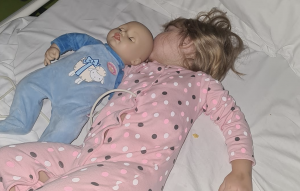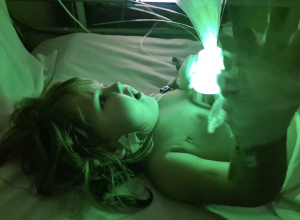Brave Young Girl Fights Off Cancer And COVID To Spend Christmas At Home
- Clara Charlton’s cancer battle started at nine months when her mother noticed a lump on the infant’s hip. She was diagnosed with Denys-Drash syndrome, a kidney disease that causes scar tissue to grow inside the organ and prevent it from properly filtering waste.
- She spent the next year in the hospital getting chemotherapy and dialysis. She could not spend Christmas at home for two years as a result, and on the third year, she found herself hospitalized once again, only this time battling Covid. She is now healthy and getting to finally spend Christmas at home this year.
- Infants diagnosed with Denys-Drash syndrome have a condition known as diffuse glomerulosclerosis. That condition causes scar tissue to form throughout the tiny blood vessels in the kidneys which are crucial to filtering out waste from the blood. This often results in kidney failure and a rare form of kidney cancer known as Wilms tumor.
Clara Charlton’s cancer battle started at nine months when her mother noticed a lump on the infant’s hip.
Read More
"The treatment affected her other kidney, which then failed, and Clara needed to go on dialysis until she could have a kidney transplant," explained her mom.
Doctors diagnosed Clara with Denys-Drash syndrome, a kidney disease that causes scar tissue to grow inside the organ and prevent it from adequately filtering waste.
Clara spent much of the following year getting chemotherapy and dialysis in the hospital, including the holiday.
"We had her first Christmas at home, but the following year she was having treatment for cancer in hospital,” noted Clayden. "The year after that, she was in on Christmas Eve for dialysis. Last Christmas, she was very poorly with Covid and was on a ventilator, which was very scary. I thought that we were going to lose her.”

Lucky for mom, Clara is a fighter.
"Clara is doing well, although she still has some kidney issues,” shared her mother. “She's in nursery now, and there were times when I thought she'd never be able to go. You look at her, and you wouldn't think there was anything wrong."
Clara is also getting to open up her personality now that she is out of the hospital and spending her days with other children.
“She's a sassy girl. She's always been so happy, even through everything,” said her mom. "She didn't speak for a long time, and she struggled to walk because she was spending so much time in bed. But when a child is poorly, there is only so much she can do."
What Is Denys-Drash Syndrome?
Denys-Drash syndrome is a condition that occurs within the first few months of an infant’s life and affects the kidneys and genitalia.
Infants diagnosed with Denys-Drash syndrome have a condition known as diffuse glomerulosclerosis. That condition causes scar tissue to form throughout the tiny blood vessels in the kidneys, which are crucial to filtering out waste from the blood.
This often results in kidney failure and a rare form of kidney cancer known as Wilms tumor. This is because 96 percent of those diagnosed with Denys-Drash symptom have an abnormality in their WT1 gene (Wilms tumor suppressor gene), according to the Journal of Medical Genetics.
In most cases, infants or toddlers will develop tumors in one or both kidneys.
The rare disorder also causes gonadal dysgenesis in males. That is a condition in which the external genitalia appear either ambiguous or entirely female. As a result, most males are infertile and cannot have biological children.
Childhood Cancer Survivor On Life After Chemo
Why Kidney Cancer Is Difficult To Diagnose
Kidney cancer is tough to detect early because so few patients experience symptoms.
“Traditionally, kidney cancer was, was diagnosed in people coming in with blood in the urine, a mass in the belly that was big enough that you could feel, or pain on that side,” Dr. Geoffrey Sonn, a urologic oncologist at Stanford Hospital and Clinics, told SurvivorNet in a previous interview. “More recently, because of the great increase in the use of imaging with ultrasound, CT scans, and MRI, most kidney cancer is diagnosed incidentally.”
Dr. Sonn explained that patients often learn they have kidney cancer while doctors are performing a scan for some other reason or trying to confirm a different diagnosis.
“Somebody has abdominal pain and undergoes a CT scan, and by chance, they’re found to have a mass in the kidney that’s kidney cancer,” cited Dr. Sonn. “So that’s the most common presentation now, is an incidental mass seen on imaging done for another reason.”
However, even that is rare because so many people experience no real symptoms until the cancer has started to metastasize in the body.
“For localized kidney cancer, for relatively small masses that have not metastasized, most often patients feel nothing,” explained Dr. Sonn. “For larger masses of the kidney, they may have pain on that side, they may see blood in the urine, or a routine urine test may show a microscopic amount of blood in the urine that’s not enough to be seen visually, but still will prompt further testing.”
How One Survivor Beat The Odds And Kidney Cancer
Learn more about SurvivorNet's rigorous medical review process.

